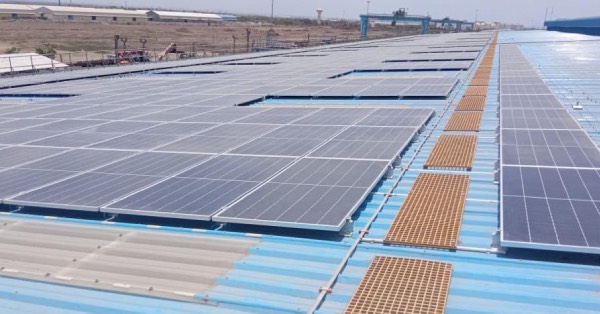APM Terminals’ pathway to decarbonisation is based on the increased use of renewable energy in owned and operated terminals, including a commitment to reach net zero across all scopes by 2040. This includes a switch to renewable electricity, direct electrification, battery electric mobile equipment, and moving from fossil to green fuels whenever possible.
As a significant share of APM Terminals’ emissions come from purchased electricity (so called scope two emissions), a near-term priority for us is to double down on switching to renewable electricity from on-site or offsite sources. During 2022 we took several actions on this front including switching to full operations on renewable electricity for eight terminals in Europe and Port Elizabeth, USA, based on purchase of renewable electricity from local utilities, and we commissioned a 1 MW onsite solar plant in Pipavav, India. APM Terminals also purchased over 180 pieces of electric or hybrid container handling equipment in 2022.

Addressing challenges starts with a plan
The challenge in addressing terminal emissions is the fragmented footprint across almost 4000 pieces of equipment and nearly 40 different locations with unique infrastructure, regulatory and concession context.
To tackle this, we have developed and implemented local terminal end-to-end roadmaps, addressing our scope 1 emissions (emissions from own operations) through a dual equipment electrification strategy: taking advantage of existing products where available and partnering with suppliers to pilot new solutions for locations with less mature options.
“The structured process allowed us to have a proper, robust debate around various options. We now have a detailed plan that we can present to our local partners,
showing them how exactly we plan to do it and that it is achievable”, shares Steven Yoogalingam, Managing Director of Suez Canal Container Terminal in Egypt.
“Connecting the decarbonisation plan to our local 2022 strategy made it possible to fire up the organisation that this was important and urgent”, adds Søren Kofoed Jensen, Managing Director of Aqaba Container Terminal in Jordan. “As a global company, we not only have the obligation to lead the way on improving our operations, but we also have the competencies to support the country in being the first in the region to develop a green value proposition and skills”.
Thinking long term
To avoid locking into carbon-based solutions by replacing diesel equipment with new diesel equipment, APM Terminals is also extending asset lifetimes whenever possible until electric alternatives are available – while prioritising safety and customer commitments. This allows us to have a more strategic and long-term approach, instead of focusing on short-term, but not sustainable solutions which our business needs.









































